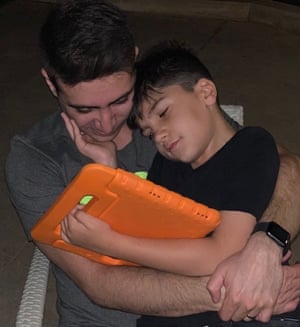A sham, advocacy groups call a process that has left thousands, like Yazdanesta and her husband, in legal limbo for years

Every morning, Hedieh Yazdanseta gets up by 5am and pulls up the US state departments website on her phone, tapping in a case number made up of 13 digits and letters she has long memorized.
She holds her breath as the page slowly loads, but disappointment quickly settles in when she sees her case is still in administrative processing. For the past two years, those words have kept Yazdanseta and her husband, Mohsen Rahmani, thousands of miles apart and unable to start the life they want to live together.
Rahmani, who lives in Tehran, has been stuck in US immigration limbo since January 2017, unable to join his wife in America because of the Trump administrations travel ban.
Ive learned over the last several years to take it a day at a time just to keep hope, Yazdanseta said in the kitchen of her home in Long Island, New York, toothy school portraits of her twochildren smiling down from a shelf full of family pictures.
Yazdanseta and Rahmani met online in 2015, while Yazdanseta was going through a divorce. She said that Rahmani was warm, kind and felt familiar to her, even through simple messages. He would send her memes and talk to her on the phone to comfort her after difficult fights with her ex-husband. When they met in person for the first time in March 2016, they knew it was love.
Like many couples in Yazdanseta and Rahmanis situation, Donald Trumps rhetoric around Muslims alarmed them. During his 2016 election campaign, Trump promised to carry out a total and complete shutdown of Muslims entering the United States.
Worried about their ability to have a future together in the US, where Yazdanseta and her children are citizens, the couple married two weeks before Trump entered the White House. On 27 January 2017, a week after his inauguration, Trump attempted to fulfil his campaign promise and unveiled the first version of a travel ban that targeted Muslim-majority countries.
Now in its third iteration, Trumps travel ban continues to separate thousands of families whose lives have been put on pause during the nearly three years the ban has been in place.
Though travelers from the countries under the ban face severe restrictions, the ban states that close family to US citizens, such as spouses and children, can receive waivers allowing them to enter the United States.
But many argue that the waiver process is a sham. Of the 56,320 people who have applied for waivers between December 2017 and October 2019, only 23% have received them, according to state department data. Applicants from Iran, like Rahmani, make up almost 60% of all visa waiver applicants yet have received 22% of the waivers given out.

Nimra Azmi, a staff attorney at Muslim Advocates, an advocacy group in the middle of a class-action lawsuit against the state department over its waiver process, said the waivers prove the travel ban is in fact a ban on Muslims. The waivers let the administration say we have a process in place and were doing things but given how long it takes for people to be processed out, it operates as an extension of the ban itself.
The process of reaching the United States was not easy even before Trump came into office, Azmi said, yet 7,000 Iranians received visas each year before the travel ban was put in place. By comparison, just 3,000 Iranians have received waivers between December 2017 and October 2019, according to state department data.
Rahmani went in for his interview with a state department officer at a consulate in Abu Dhabi in January 2018 and answered questions about his marriage and their situation. The officer told him that had the travel ban not been in place, he would have been able to get a visa that day. But my hands are tied, she told him, Yazdanseta said.
Yazdanseta has spent the past two years sending letters to the consulate and her congressional representatives, and has gone through two lawyers to understand when Rahmani will receive an answer on his application.
Her ex-husbands death in December 2018 exacerbated the situation, leaving Yazdanseta the sole caretaker of her two children.
Her 15-year-old daughter, Lilly, helps take care of eight-year-old Aiden, who has autism. But making sure Aiden gets his medication and goes to his doctors appointments on time has been difficult.
Her income as an event planner and facilities manager at Stony Brook University has not been enough to pay her mortgage, and her house could be foreclosed. The letters, which Yazdanseta showed to the Guardian, mention her circumstances, but efforts to push Rahmanis application forward have been met with no success.

Rahmani, a pilot, has been working toward getting his instructors license with the hope that when he gets to the United States he can get a job as a pilot instructor and help support Yazdanseta and her children. Yazdanseta wants to get her PhD in education, but does not have the time to take classes.
Its so, so difficult. Its frustrating, Yazdanseta said, tearing up. I worry how much longer we can live like this. I just feel like Im losing out on my life. Were losing out on our lives.
The stress of navigating the waiver process has spread to Lilly, Yazdansetas daughter.
Like most teenagers, Lilly spends time on Snapchat, doing homework or trying to perfect her recipe for scones. Although she rarely talks politics with her friends, she said, Lilly was in middle school when the travel ban began to affect her family and vividly recalls the pain she felt seeing her mom trying to navigate the process over the years.
While it took Lilly some time to get to know Rahmani through Facetime and phone calls, she has come to see him as part of their family, especially after a trip to Turkey in October.
It affects me and [my brother], too, our whole family, she said, sitting at the kitchen table with Yazdanseta, wiping away tears.
It has beenmore than 30 years since Yazdanseta immigrated from Iran to the United States with her family, fleeing the war between Iran and Iraq in the 1980s. She has been in New York ever since, learning English with a subtle Long Island accent.
Yazdanseta can recall the days when she had just moved to the United States as a young girl. Her classmates teased her for her heavy Persian accent and for looking different than everyone else.
I was told to go home a lot, go back to where you came from, she said.
Seeing recent anti-Muslim and anti-immigrant rhetoric, like when Trump told a group of congresswomen to go back and help fix the totally broken and crime-infested places from which they came, brought back the pain that she felt in her childhood trying to adjust to a new country.
Its really disturbing and hurtful for me to see the reality of what this country really is about, Yazdanseta said. Im thankful that we have our freedom I am recognizing that I still have these rights. But my most important right, to have my family, is taken away from me.
Original Article : HERE ;
from MetNews https://metnews.pw/three-years-of-waiting-trump-travel-ban-bureaucracy-keeps-iranian-couple-apart/
No comments:
Post a Comment